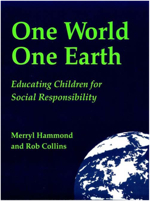By Holly Johnson, University of Cincinnati, Cincinnati, OH
 If you ask me what I came to do in the world, I, an artist, will answer you: I came here to live out loud. — Emile Zola
If you ask me what I came to do in the world, I, an artist, will answer you: I came here to live out loud. — Emile Zola
Kathy Short’s June WOW Currents posts broached the issue of the social responsibility of the reviewer. I should have responded then, but waited because that posting had me thinking about Rosenblatt’s theory of transaction and the relationship between the reader and the author’s text. Searching the Internet, I found a Wikipedia entry on social responsibility along with One World, One Earth: Educating Children for Social Responsibility by Merryl Hammond and Rob Collins. After more thought, I am beginning to wonder, what is the connection to reading and social responsibility, especially if and when we find ourselves “outsiders” to the culture highlighted in the text?
It seems to me, especially in connection to my last posting about the definitions and connections of international/global/multicultural literature, that it would be interesting to talk with young people about how reading itself is not only a social responsibility, but what would it be to take a reading stance that privileges social responsibility. Perhaps, I am getting ahead of myself here since I have not defined my idea of social responsibility in respects to reading.
I see social responsibility with respect to a reading event as being open to what the text could teach me with a spirit of acceptance of difference, but at the same time needing to acknowledge my own ignorance of a culture. Concurrently, I must acknowledge that my cultural upbringing is only one of many, not THE BEST ONE. A reading stance that embraces social responsibility means I would have to be diligent in acknowledging my own biases and constantly remind myself that one text is indeed only one text, and thus there is complexity to the issue, the culture, and the people represented in the piece. Additionally, there is the possibility of discussing the book with someone who may know about the culture represented in the book and how I could approach them about what I am reading and how I am responding. That’s a lot to do while engaging a text, but in reality, this type of stance is simply being conscious of 1) readers as cultural beings and 2) no culture is monolithic.
How difficult would that stance be to teach? To be embraced? How would this stance impact reading for pleasure? In what ways can we, as readers, embrace both pleasure and social responsibility? (See Alvermann & Xu, 2003 for discussion.)
I ask the last question because it seems that a stance of social responsibility would include elements of critical literacy along with aspects of culturally-situated response. Critical literacy with its questioning stance would seem not all that great a stretch when reading a text that is outside my own culture, but I would really have to watch what prompts my questions. I would have to question my own questions — look deeply at what biases I assume with my questioning stance.
As far as a culturally-situated response, I could be expected to reflect upon what I bring to the text, my knowledge as well as my biases and through that multifaceted lens, examine what I uncritically accept and what I have difficulty accepting. I can’t just say “the book isn’t a genre I like” or “it’s obscure” or “it wasn’t interesting.” I have to take the opportunity to examine what it is within me that provoked such a response, and not blame the book for it. I would become responsible (able to respond with integrity) for my transactions, and know that while transactions are subconscious, I would need to examine closely the “poem” I have created. This kind of practice would require deep reflection that many of us may not typically equate with reading for pleasure. There is pleasure with deep reflection in examining the unexamined, if you like — especially if we do so in a reflective community with others. (See MIT’s Center for Reflective Community’s PowerPoint presentation, Critical Moments Reflection Methodology for more information about the methodology).
If we were to attempt to ask our students to read for pleasure with a stance that embraced social responsibility, what books would you choose? Where would you start? Where is the place of international literature in such a practice?
And to answer Kathy’s question, yes, reviewers might attempt to be socially responsible. It seems like we might want to do this, which means we might necessarily have to do a bit of research and assert, as Marilyn Carpenter does, that the text we are engaging at any one time represents only one perspective of many about this particular life experience. I wonder if we taught ourselves to be socially responsible readers, then reviewers would have to make this statement as often as they currently need to do.
Please visit wowlit.org to browse to browse or search our growing database of books, to read one of our two on-line journals, or to learn more about our mission.
- Themes: Holly Johnson
- Descriptors: Debates & Trends, WOW Currents
